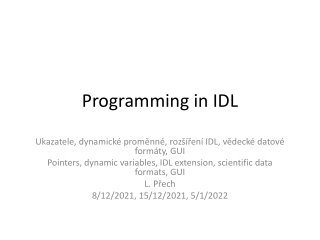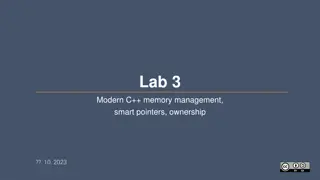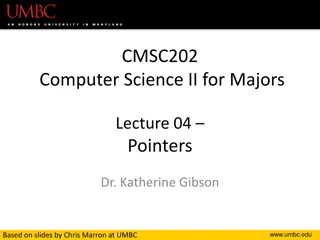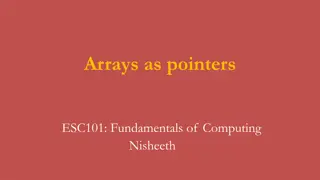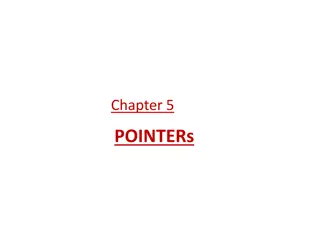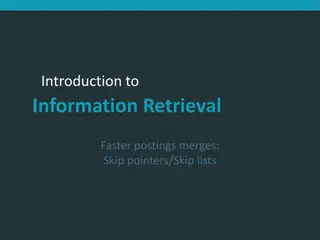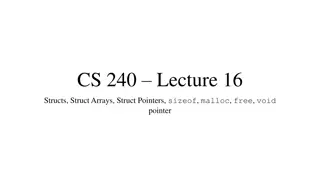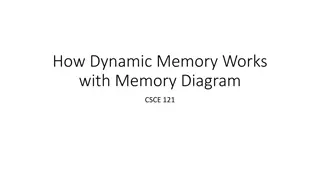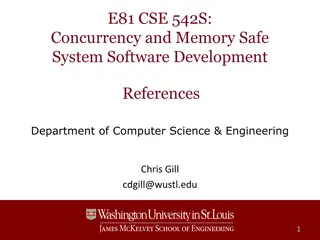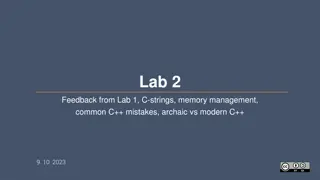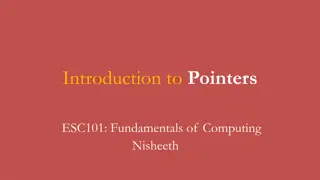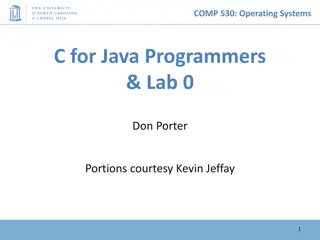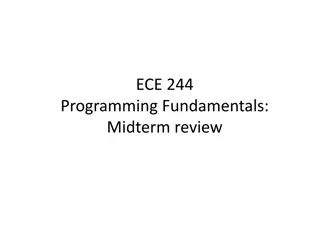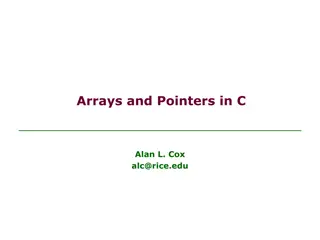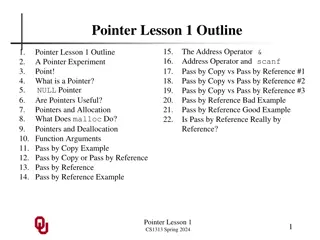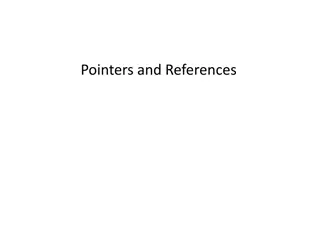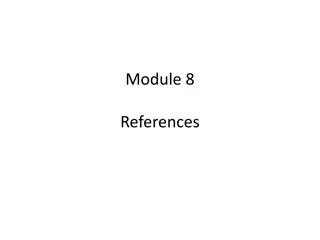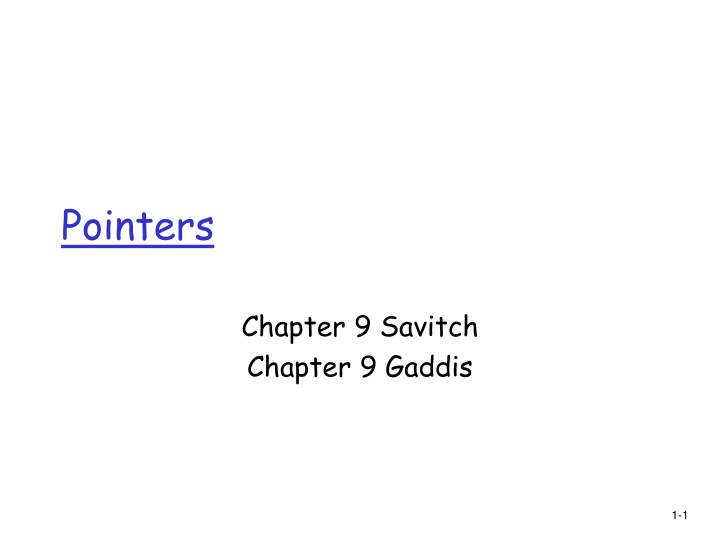
Pointers and Function Parameters in C++
Explore the concepts of pointers, function parameters, memory storage, and pointer variables in C++. Learn about call-by-value, call-by-reference, arrays, and the distinction between lvalues and rvalues in programming.
Download Presentation

Please find below an Image/Link to download the presentation.
The content on the website is provided AS IS for your information and personal use only. It may not be sold, licensed, or shared on other websites without obtaining consent from the author. If you encounter any issues during the download, it is possible that the publisher has removed the file from their server.
You are allowed to download the files provided on this website for personal or commercial use, subject to the condition that they are used lawfully. All files are the property of their respective owners.
The content on the website is provided AS IS for your information and personal use only. It may not be sold, licensed, or shared on other websites without obtaining consent from the author.
E N D
Presentation Transcript
Pointers Chapter 9 Savitch Chapter 9 Gaddis 1-1
What have we learned about when we learned about function parameters? 1-2
What have we learned about when we learned about function parameters? Call-by-Value also known as scalars (eg. int, double, char, float) Call-by-Reference which refer to the location of the variable (aka alias) Arrays which is neither by-value nor by-reference but they behave like reference What can we learn from array parameters? 1-3
Data is stored in memory every variable has a memory address, whether a byte is needed or 4 (char vs int) when a variable is defined, it s memory address cannot be predicted. It is determined by the system. example: int temp; any data value requiring multiple bytes is stored consecutively in memory and identified by the address of the first byte. to find the amount of memory (number of bytes) assigned to a variable or a data type? Use sizeof(int), or sizeof x 1-4
Pointers Pointer: a pointer is the memory address of a variable An address of a variable is stored in memory as a pointer Pointers "point" to a variable similarly to references References are memory addresses that can t be changed once assigned to an address. When a variable is used as a call-by-reference argument, its address is passed. It is bound to that address forever. Pointers can be changed by being assigned to a different address! 1-5
Declaring Pointers Pointer variables must be declared to have a pointer type Example: To declare a pointer variable p that can "point" to a variable of type double: double *p; The asterisk identifies p as a pointer variable double dValue; How do you get the address of a variable? double *p = &dValue;
Terminology: Lvalues & rvalues pointer value is the address of an lvalue. a variable, a reference, or any assignable thing including pointers. lvalue: any expression that refers to an internal memory location capable of storing data. It can appear on the left hand side of an assignment. Example: x=1.0; rvalue: includes all lvalues plus expressions 1-7
Declaring pointer variables Examples of declaring pointers: int *p; char *cptr; (initially, p and cptr contain some garbage values, so, a good practice is: int *p=NULL;) Note: pointers to different data types are different! Difference? int *p1, *p2; int *p1, p2; 1-8
The address of Operator The & operator can be used to get the address of a variable which can be assigned to a pointer variable Example: p1 = &v1; p1 is now a pointer to v1 v1 can be called v1 or "the variable pointed to by p1"
The Dereferencing Operator C++ also uses the * operator with pointers The phrase "The variable pointed to by p" is translated into C++ as *p Here the * is the dereferencing operator p is said to be dereferenced
Fundamental pointer operations & address-of example: int *p; int a=10; p=&a; * variable that is pointed to (* also called dereferencing operation) example: *p=5; they are used to move back and forth between variables and pointers to those variables. Problem? int *aptr; *aptr=5; //the variable pointed to by aptr has to be valid int *p=NULL; <=> int *p; p=NULL; 1-11
Why pointers Allow one to refer to a large data structure in a compact way. Passing around the address is efficient. Each pointer (or memory address) typically fits in four or eight bytes of memory! (32-bit is 4 bytes; 64-bit is 8 bytes) Different parts of a program can share the same data: passing parameters by reference (passing address between different functions) can change the original argument. One can reserve new memory in a running program: dynamic memory allocation Build complicated data structures by linking different data items 1-12
Initialize a pointer variable? Lets assume a variable named array is a pointer variable, then int *p=array; or int *p; p=array; 1-13
Example int x, y; int *p1, *p2; 1000 x 1004 y 1008 p1 1012 p2 1-14
Example int x, y; int *p1, *p2; x=-42; y=163; -42 1000 x 163 1004 y 1008 p1 1012 p2 1-15
Example int x, y; int *p1, *p2; x=-42; y=163; p1=&x; p2=&y; -42 1000 x 163 1004 y 1000 1008 p1 1004 1012 p2 1-16
Example int x, y; int *p1, *p2; x=-42; y=163; p1=&x; p2=&y; -42 1000 x 163 1004 y 1000 1008 p1 1004 1012 p2 *p1=17; 17 1000 x 163 //*p1 is another name of for x 1004 y 1000 1008 p1 1004 1012 p2 1-17
A Pointer Example v1 = 0; p1 = &v1; cout << *p1; //same as cout<<v1; cout <<p1; *p1 = 42; cout << v1 << endl; cout << *p1 << endl;
output: 42 42 1-19
example int x, y; int *p1, *p2; x=-42; y=163; p1=&x; p2=&y; *p1=17; /* another name of for x*/ 17 1000 x 163 1004 y 1000 1008 p1 1004 1012 p2 p1=p2; /* pointer assignment, now two pointers point to the same lacation*/ 17 1000 x 163 1004 y 1004 1008 p1 1004 1012 p2 1-21
example int x, y; int *p1, *p2; x=-42; y=163; p1=&x; p2=&y; *p1=17; /* another name of for x*/ 17 1000 x 163 1004 y 1000 1008 p1 1004 1012 p2 *p1=*p2; /*value assignment*/ 163 1000 x //think of *p1 as another name of the variable p1 points to. 163 1004 y 1000 1008 p1 1004 1012 p2 1-22
NULL pointer assign NULL constant to a pointer variable to indicate that it does not point to any valid data internally, NULL is value 0. Recall our example int *p; char *cptr; (initially, p and cptr contain some garbage values, so, a good practice is: int *p=NULL;) 1-23
Passing pointers as parameters behave like pass by reference. Suppose we want to set x (defined in main() function) to zero, compare the following code: int x=7; /*pass by value*/ void SetToZero (int var) { var=0; } SetToZero(x); /*pass by reference*/ void SetToZero(int *ip) { *ip=0; } SetToZero(&x); //we are still copying the value of &x into local //variable ip in function SetToZero 1-24
int main () { x=163; SetToZero(x); } stack frame for main() in our computer s memory 163 1000 x 1004 1008 1012 163 1208 var stack frame for SetToZero() in our computer s memory void SetToZero (int var) { var=0; } 1212 1-25
int main () { x=163; SetToZero(x); } 163 1000 x 1004 stack frame 1008 1012 0 1208 var void SetToZero (int var) { var=0; } stack frame 1212 1-26
163 1000 x int main () { x=163; SetToZero(&x); } 1004 stack frame 1008 1012 1000 1208 ip stack frame void SetToZero(int *ip) { *ip=0; } 1212 1-27
0 1000 x int main () { x=163; SetToZero(&x); } 1004 stack frame 1008 1012 1000 1208 ip stack frame void SetToZero(int *ip) { *ip=0; } 1212 1-28
Passing parameters by reference via pointers Suppose we want to set x to zero, compare the following code: void SetToZero (int var) { var=0; } SetToZero(x); /* has no effect on x*/ stack frame stack frame SetToZero(x); var=x; var=0; stack frame stack frame void SetToZero(int *ip) { *ip=0; } SetToZero(&x); /* x is set to zero, call by reference */ SetToZero(&x); ip=&x; *ip=0; Call by reference equivalently, this means: copy the pointer (to that variable) into the pointer parameter 1-29
Lets convert swap to pointers First write it as a function with references Change the parameters to pointers Change the code to use pointers What s the difference? Are references clearer or pointers? Google C++ standard bans call-by-reference claiming it is unclear when reading code that has reference parameters. It s not obvious. But, references were added to avoid problems! 1-30
References vs. Pointers References are assigned for the life of the reference. Can t be changed. How would one change a reference? int x, y, int& z = x; // references must be assigned z = y; // this assigns the value of y to x Pointers can be changed by reassigning them. int v, w; int* p = &v; *p = 5; p = &w; 1-31
Example: Lets do this in lab write a program to solve quadratic equation: ax^2 + bx + c = 0; program structure: input phase: accept values of coefficients from users; computation phase: solve the equation based on those coefficients; output phase: display the roots of the equation on the screen static void GetCoefficients(double *pa, double *pb, double *pc); static void SolveQuadratic(double a, double b, double c, double *px1, double *px2); static void DisplayRoots(double x1, double x2); three values passed from phase 1 to phase 2 two values passed from phase 2 to phase 3 need to pass parameters by reference! 1-32
So far 1-33
The new Operator Using pointers, variables can be manipulated even if there is no identifier (or name) for them To create a pointer to a new "nameless" variable of type int: int *p1; p1 = new int; The new variable is referred to as *p1 *p1 can be used anyplace an integer variable can cin >> *p1; *p1 = *p1 + 7;
Dynamic Variables Variables created using the new operator are called dynamic variables Dynamic variables are created and destroyed while the program is running Additional examples of pointers and dynamic variables are shown in Display 9.2 An illustration of the code in Display 9.2 is seen in Display 9.3
Display 9.2 Slide 9- 36
Display 9.3 Slide 9- 37
Caution! Pointer Assignments Some care is required making assignments to pointer variables p1= p3; // changes the location that p1 "points" to *p1 = *p3; // changes the value at the location that // p1 "points" to
Basic Memory Management An area of memory called the freestore is reserved for dynamic variables New dynamic variables use memory in the freestore If all of the freestore is used, calls to new will fail Unneeded memory can be recycled When variables are no longer needed, they can be deleted and the memory they used is returned to the freestore
The delete Operator When dynamic variables are no longer needed, delete them to return memory to the freestore Example: delete p; The value of p is now undefined and the memory used by the variable that p pointed to is back in the freestore
Dangling Pointers Using delete on a pointer variable destroys the dynamic variable pointed to If another pointer variable was pointing to the dynamic variable, that variable is also undefined Undefined pointer variables are called dangling pointers Dereferencing a dangling pointer (*p) is usually disasterous STOPPED HERE
Automatic Variables Variables declared in a function are created by C++ when calling the function, and they are destroyed when the function call ends These are called automatic variables because their creation and destruction is controlled automatically The programmer manually controls creation and destruction of dymamic variables with operators new and delete
Global Variables Variables declared outside any function definition are global variables Global variables are available to all parts of a program Global variables are not generally used
Type Definitions A name can be assigned to a type definition, then used to declare variables The keyword typedef is used to define new type names Syntax: typedef Known_Type_Definition New_Type_Name; Known_Type_Definition can be any type
Defining Pointer Types To avoid mistakes using pointers, define a pointer type name Example: typedef int* IntPtr; Defines a new type, IntPtr, for pointer variables containing pointers to int variables IntPtr p; is equivalent to int *p;
Multiple Declarations Again Using our new pointer type defined as typedef int* IntPtr; Then, we can prevent this error in pointer declaration: int *P1, P2;//Only P1 is a pointer variable with IntPtr P1, P2; // P1 and P2 are pointer variables
Pointer Variables and Array Variables Array variables are actually pointer variables that point to the first indexed variable Example: int a[10]; typedef int* IntPtr; IntPtr p; Variables a and p are the same kind of variable Since a is a pointer variable that points to a[0], p = a; causes p to point to the same location as a
Pointer Variables As Array Variables Continuing the previous example: Pointer variable p can be used as if it were an array variable Display 9.4 Display 9.5 Display 9.5 Example: p[0], p[1], p[9] are all legal ways to use p Variable a can be used as a pointer variable except the pointer value in a cannot be changed This is not legal: IntPtr p2; // p2 is assigned a value a = p2 // attempt to change a
Display 9.4 Slide 9- 49
Pointer Reference Parameters A second advantage in using typedef to define a pointer type is seen in parameter lists Example: void sample_function(IntPtr& pointer_var); is less confusing than void sample_function( int*& pointer_var);

